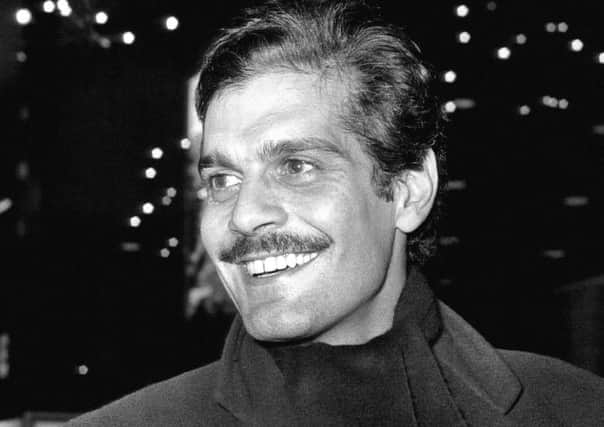Obituary: Omar Sharif, actor


The actor Omar Sharif was a rare breed in 20th-century cinema, a dashing and much-adored leading man whose abilities also commanded critical acclaim, particularly for what are regarded as being his three defining roles; as the flinty Arab fighter Sherif Ali in David Lean’s Lawrence of Arabia (1962), the artistic young medical student Yuri Zhivago in Lean’s admired 1965 adaptation of the Boris Pasternak novel Doctor Zhivago, and as Barbra Streisand’s leading man in the 1968 romantic musical Funny Girl (and its 1975 sequel Funny Lady).
He was also one of Egypt’s most internationally famous stars and one of the first actors of Middle Eastern descent to achieve mainstream success in Western cinema. Born Michel Demitri Chalhoub in Alexandria to Lebanese timber merchant father Joseph and Syrian-Lebanese mother Claire, he played down his family’s wealth. Yet they were well-connected to the extent that King Farouk I was a personal friend of the family and particularly of Sherif’s socialite mother.
Advertisement
Hide AdAdvertisement
Hide AdSharif always spoke fondly of his mother, although he also remarked more than once, off the cuff, that she would beat him when he was young. He was sent to a British boarding school (Sharif joked that it was because “the food was bad and [my mother] wanted me to lose weight”), studied physics and mathematics at Cairo University and briefly took a post with his father’s business, before studying at the Royal Academy of Dramatic Arts in London.
The esteemed Egyptian director Youssef Chahine discovered Sharif and brought him stardom across Egypt by casting him as the lead in 1953’s romantic drama Sira’ Fi al-Wadi (Struggle in the Valley) when the actor had barely reached his 20s. During the rest of the decade and on into the 1960s he consolidated his reputation in his home country as a dashing and skilled leading man, often appearing alongside the actress Faten Hamama, a former child star turned adult lead. The pair met when they starred together in Sira’ Fi al-Wadi, sharing Hamama’s controversial first screen kiss; they married soon after.
Sharif’s career broke new ground in 1962, when he went to Jordan to film Lawrence of Arabia with Lean, occupying one of the only Middle Eastern roles played by a genuine native of the region. His first Western role defined his career and his life from then on, the performance earning him a Golden Globe win and an Oscar nomination as best supporting actor and the attention of Hollywood’s casting directors.
At the same time, he and the film’s lead Peter O’Toole formed a friendship which would last throughout their lives. O’Toole’s greeting to Sharif upon their first meeting was a declaration that he didn’t believe the actor’s name was “Omar Sharif” (he technically wasn’t – the surname of his stage identity meant “noble” in Arabic) and that he must really be called “Fred”. The nickname “Cairo Fred” stuck.
Bolstered by American interest in his talents and the bond he had formed with one of the most acclaimed actors of his time, Sharif signed a seven-year deal with Columbia Pictures, although the most fruitful period of his career also ended up being the most personally disruptive.
Following the Egyptian revolution of 1952 his father’s business had already suffered from the nationalisation policies of the Nasser government, and the need for Egyptian citizens to have exit visas coupled with financial controls meant it was easier for Sharif not to return to his home country, instead lodging in European hotels between productions.
This way of life cost him his marriage, with the pair separating so as not to risk infidelity, and Sharif spending much of his adult life as a rootless playboy bachelor staying in expensive hotels. He dated Streisand for three months while they filmed Funny Girl, and her public support for the state of Israel almost cost him his Egyptian citizenship. He gambled at the plushest casinos and owned several racehorses, playing bridge to international standard, writing books and columns on the subject.
His acting career was busy, although the best of it came early. He played Genghis Khan in 1965’s film of the same name and Che Guevara in 1969’s Che! Sidney Lumet directed him in 1969’s The Appointment and he appeared with Sophia Loren in More Than a Miracle (1967), O’Toole again in The Night of the Generals (1967), Julie Andrews in The Tamarind Seed (1974), and Richard Harris and Anthony Hopkins in Juggernaut (1974). For Doctor Zhivago, he won best actor award at the Golden Globes.
Advertisement
Hide AdAdvertisement
Hide AdAs his youthful looks faded, so did Sharif’s profile in Hollywood. He spent the last quarter of the century keeping busy in lower-profile Hollywood fare, staging a late-career rally in 2003 with a lead part in the French film Monsieur Ibrahim et les fleurs du Coran (M Ibrahim and the Flowers of the Koran) which won him the French Cesar Award for best actor. It was a highlight amidst elder roles in respectably large Hollywood projects such as John McTiernan’s The 13th Warrior (1999), Steve Coogan comedy The Parole Officer (2001), and opposite Viggo Mortensen in 2004’s Hidalgo. In May his son Tarek revealed in an interview that Sharif had Alzheimer’s disease, less than two years after his final film role in the French-Moroccan drama Rock the Casbah.
Sharif died at home in Cairo of a heart attack and is survived by Tarek and his two grandsons, Omar, an actor and activist, and Karim. He converted to Islam from Catholicism to marry Hamama – Tarek’s mother – in 1954, although they divorced exactly two decades later. He never remarried. “I never loved anyone except her until now,” he said in 2014; he survived her by six months.